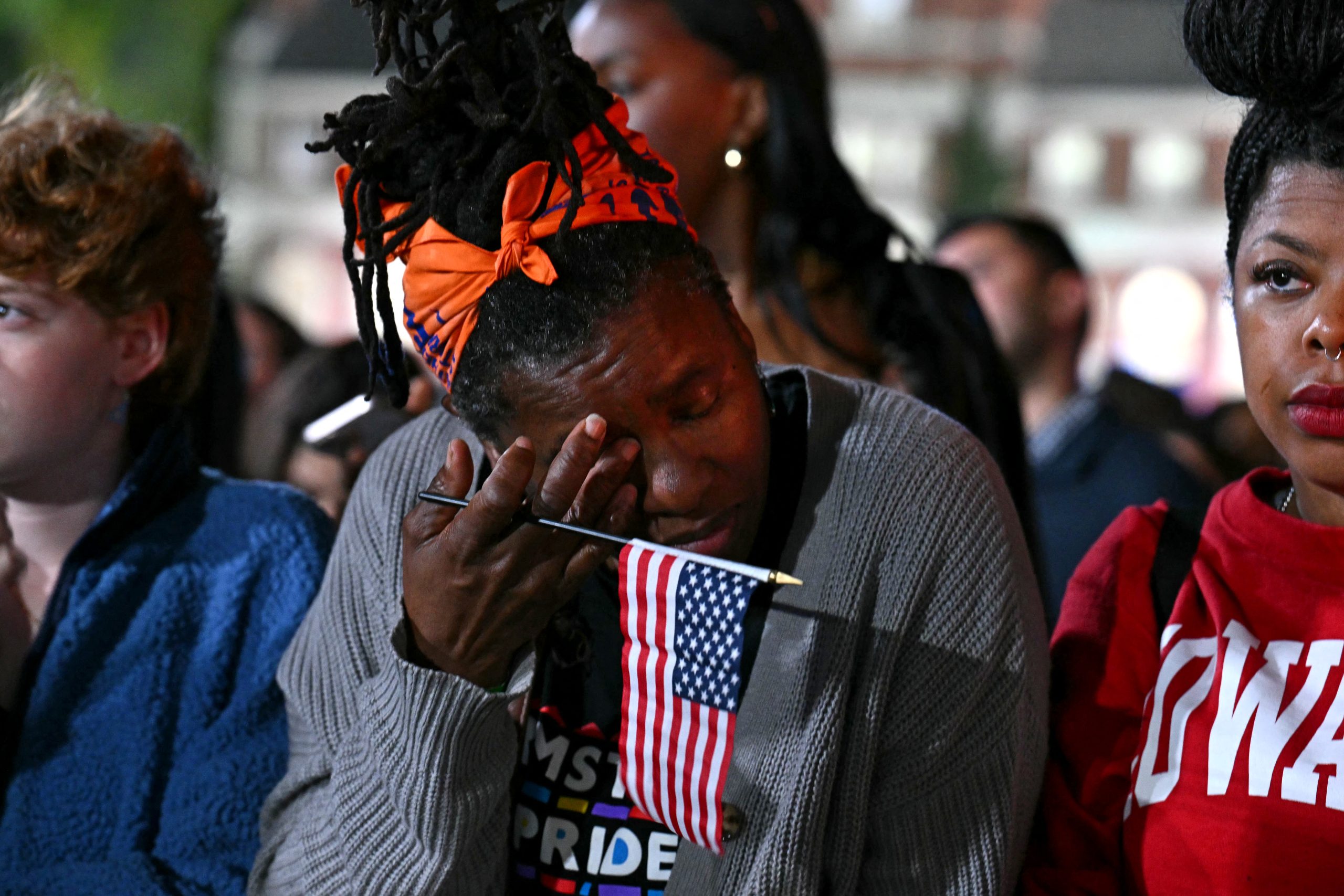
The dread many Black Americans feel about Donald Trump’s triumph in the 2024 presidential election isn’t misplaced: He organized his reelection campaign against Vice President Kamala Harris around revenge — around how he and his allies can inflict the greatest amount of suffering on vulnerable groups and on those he considers enemies.
Making things worse, the same party that elevated Trump even after he fueled an attack on the U.S. Capitol — on multiracial democracy — has taken back the Senate and is poised to retain its control of the House, meaning that any possibility of advancing Black equality is, at best, slim.
In the face of this sobering reality, the NAACP said in a statement that it “stands firm” in its “mission to protect the civil rights and dignity of Black and marginalized communities.” It added that its “commitment to social justice and equity is as resolute as ever.”
The coming months will be saddled with anxiety. Here’s what you need to know about Trump’s policy positions on key issues.
Economy
For years, Trump has said that he’s done more for Black people than anyone else — Abraham Lincoln, he’s added, might be an exception — and he’s suggested that he’ll protect “Black jobs,” whatever those are.
And yet, Trump’s policy proposals, which include granting tax cuts to corporations and increasing military spending, would do less for everyday Americans while adding more to the federal debt than Harris’ proposals would have. Some of her costlier but more people-centered measures included expanding the child tax credit and boosting federal spending on health care, plans that would have been a boon for struggling Black families.
Trump also has demonstrated an obsession with increasing tariffs — by as much as 20% generally and by as much as 60% for China — despite the fact that such measures can pass costs on to voters and even serve as kindling for trade wars.
When it comes to inflation, Trump and his allies enjoy blaming President Joe Biden. The challenge we’re seeing now, however, has roots in the COVID-19 pandemic, which the Trump administration was reluctant to rein in — even as it killed Black Americans at twice the rate of white Americans — and which left Biden in a tough spot at the start of his term.
Law and justice
Trump hasn’t hidden the fact that he wants to use the U.S. Department of Justice to prosecute his supposed opponents, whom he prefers to call “the enemy within” and whom he continues to falsely contend rigged the 2020 presidential contest.
“It would be a very scary agency if you ended up with someone who’s basically the investigative arm of the president,” Asha Rangappa, a senior lecturer at Yale University’s Jackson School of Global Affairs and a former FBI special agent, recently stressed. “What people I think need to understand is that you would essentially have a government that resembles the mob — the president is the mob boss, and law enforcement is his muscle.”
Since 2022, when Trump began to prepare for his third White House bid, the onetime businessman turned wannabe king has “issued more than 100 threats to investigate, prosecute, imprison or otherwise punish his perceived opponents,” including racial justice organizers, poll workers, journalists, judges, and prosecutors, an October NPR review of Trump’s media conferences, rallies, interviews, and social media posts found.
Phrased differently, with a second Trump administration, there will likely be under-enforcement of the law for groups Trump believes are part of his coalition, and over-enforcement for anyone who stands against him.
Reproductive rights
Realizing how politically unpopular anti-abortion stances are, Trump has tried to avoid talking about the right to abortion, an issue that disproportionately affects Black women. He has said that the issue ought to be left to the states, and has claimed on his bespoke social media platform that his administration would be “great for women and their reproductive rights.”
But we’ve seen how untrue that statement is. Just in August, Trump told Fox News that he would vote against a Florida ballot measure that would enshrine the right to abortion in the state constitution. (That measure failed on Tuesday.)
That same month, he indicated at a news conference that he’d be open to using federal regulations to restrict access to abortion pills. In February, one of his lawyers was even clearer, bragging, “We don’t need a federal ban when we have Comstock on the books.” He was referring to a 151-year-old law that could be used to block abortion-related medications.
Additionally, while Trump might insist that his administration would be “great for women,” he enjoys taking credit for appointing three of the U.S. Supreme Court justices who overturned Roe v. Wade and turned back the clock on a long-cherished freedom.
Education and diversity
Trump wants to further gut initiatives that address the country’s ongoing history of racial inequality. In May, he told Time that “there is a definite anti-white feeling in this country, and that can’t be allowed.”
In line with that illogic, which is also one of the animating themes of Project 2025, Trump hopes to use executive orders to eliminate diversity, equity, and inclusion programs in the federal government and the private sector.
He’s also regularly opposed canceling student loan debt, a move that would especially help Black borrowers. He complained to Moms for Liberty, a right-wing group, in June 2023 that wiping out this debt would be “very, very unfair to the millions and millions of people who have paid their debt through hard work.”
That same month, Trump showered praise on the Supreme Court’s gut punch of a decision to obliterate affirmative action in higher education: “This is a great day for America. People with extraordinary ability and everything else necessary for success, including future greatness for our country, are finally being rewarded,” he claimed in a statement, ignoring how white and wealthy applicants continue to be the primary beneficiaries of the unfair practice of legacy admissions.
LGBTQ rights
Toward the end of the campaign, Trump latched onto LGBTQ Americans, using them as a political football to mobilize his base: “Kamala is for they/them,” an election ad said. “President Trump is for you.”
It was just one more example of the disdain that he has for this group, and in particular transgender Americans. He’ll likely bring this cruelty to the White House, as Black transgender Americans continue to bear the brunt of anti-LGBTQ discrimination.
Trump has promised to pull Medicaid and Medicare funding from doctors and hospitals providing youth with gender-affirming care. This is despite the fact that such treatment, which the American Medical Association and the American Academy of Pediatrics endorses and which can include both medical and nonmedical interventions, isn’t commonly performed on youth.
Additionally, Trump has pledged to “ban men” from women’s sports. It’s harmful language that only further demonizes transgender women. It also echoes the venom that he directed at LGBTQ Americans during his first term in the White House, when he prohibited transgender individuals from serving in the military. He’s vowed to bring this ban back.
Immigration
Trump hasn’t only said that he intends on conducting mass deportations of undocumented immigrants and ending birthright citizenship — he’s also said that he plans on deploying the military if he has to.
“Under my leadership, we will use all necessary state, local, federal and military resources to carry out the largest domestic deportation operation in American history,” he said in March 2023, mirroring the vitriol he’s directed at Muslim-majority countries, which he wants to ban entry from.
Notably, the closing months of the campaign underscored the animus that Trump has for Black immigrants. He and U.S. Sen. JD Vance of Ohio repeated false claims that Haitian immigrants in Springfield, Ohio, were eating household pets. They tapped into age-old racist rhetoric that resulted in dozens of bomb threats in the city.
“This is not new in the United States of America. It’s an old playbook, used around election times, that is anti-Black and that these so-called savages are trying to destroy your way of life,” Erik Crew, a staff attorney at the Haitian Bridge Alliance whose family migrated to Ohio from the South during the Jim Crow-era, previously told Capital B. “This goes back hundreds of years.”
Climate
Trump downplays the seriousness of climate change, despite long-established evidence that shows otherwise and that poor Black communities are disproportionately devastated by it.
He at times calls global warming a “hoax.” He also insists that human activity is only one cause of it, and that this change isn’t intensifying extreme weather events.
At a rally in March 2022, he mocked John Kerry for worrying that “the ocean will rise one-hundredth of one percent over the next 300 fuckin’ years” while Russia threatens the country.
During his first term in the White House, Trump rolled back more than 125 regulations created to stave off global warming and protect the environment. It’s likely that he’ll aggressively use the powers of the state to take similar actions during his second term.



